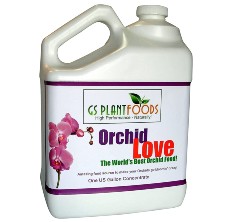Orchids are a truly beautiful addition to any home, but growing and caring for them requires considerable patience and attention. Proper fertilization is essential for keeping your orchid healthy and thriving, for example, but choosing the right one can get pretty overwhelming with so many products on the market. Thankfully, there's no need to worry! In this article, we've compiled a list of the best orchid fertilizers for 2024 to help you make an informed decision — my top pick is GS Plant Foods Orchid Fertilizer. With the right fertilizer, your orchid will grow and bloom strong and healthy. Let's get started!
Our Top Picks For Orchid Fertilizers
Buying Guide: Orchid Fertilizers
When it comes to optimizing your orchid’s growth, an orchid fertilizer is your best bet. But, if you’re planning on using one, it is important to take a range of different qualities into account. Read on for a comprehensive buyer’s guide to help select the ideal fertilizer for your orchid’s needs.
Nutrient content
The key to healthy and flourishing orchids is balanced nutrient content. Look for a fertilizer that provides the right ratio of nitrogen, phosphorus, and potassium, which are essential for orchids to thrive. Some formulas will provide all three equally, while others may be tailored more toward flowering or vegetative growth. Make sure to read the label carefully to determine which is most suitable for your needs.
Trace elements
Orchids require small amounts of micronutrients such as iron, magnesium, manganese, copper, zinc, and boron to remain healthy and vigorous. Look for a formula that includes trace elements of these minerals to ensure proper nutrient availability.
pH level
The ideal pH range for orchids is 5.5 to 6.5. When choosing a fertilizer, pick one that has an alkaline level as close to 6.0 as possible to make sure that the orchid can absorb the nutrients efficiently.
Chelated ingredients
When looking at fertilizer labels, pay close attention to the chelated ingredients. This simply means that certain minerals, such as iron, manganese, and zinc have been combined with organic molecules, making them easier for the roots of the orchid to absorb. If possible, look for chelated versions of these minerals to ensure your orchid gets the most out of its nutrients.
Packaging
The fertilizer packaging should be secure so there is no risk of leakage or spillage during transport or storage. Ensure the bag is made from a sturdy material that won’t easily tear, as well as if it seals tightly enough to prevent moisture from entering the bag and spoiling the fertilizer inside.
Application method
Different types of fertilizers are better suited for different types of application methods. Some products may be designed for soil-drenching methods, while others are better used when watering with a hose or watering can — make sure you’re choosing the right type for your needs.
Brand
It’s wise to choose a recognized brand with experience in developing formulas specifically tailored toward meeting the needs of orchids. Turning to customer reviews can be helpful here! By doing this, you can be sure that you’re investing in a quality product that will benefit the growth of your orchids in the long run.
Concentration
Consider the container type and nutritional concentration of liquid fertilizer if you purchase one. Depending on the needs of your plants, you may need to dilute them before application; thus, keep this in mind when selecting a product.
Different Types of Fertilizers
Liquid fertilizers
Liquid fertilizers provide a quick release of nutrients that are easily absorbed by your orchids. They are the most effective weekly supplements because they do not stay in the soil long.
Granular fertilizers
Granular fertilizers are slow-release fertilizers that slowly break down over time to provide nutrients to your plants over an extended period. These are great for supplementing plants between active growing periods but should not be used as a sole source of nutrition.
Organic fertilizers
Organic fertilizers are made from natural ingredients such as kelp extract, fish emulsion, and even chicken manure. These orchid fertilizers are great for adding additional organic material into the soil, but may still require additional nutrient supplementation depending on what type of potting mix your plant is in.
Tips to Properly Fertilize Orchids
- Regularly fertilize your orchids with a balanced fertilizer to provide them with all the necessary nutrients to grow healthy and strong.
- Use a diluted solution of liquid fertilizer once a week when actively growing, but reduce this amount in winter when growth slows down.
- Make sure you only use enough fertilizer to give your orchids the nutrients they need. Avoid over-fertilizing, as this can be harmful.
- To prevent burning, don’t fertilize your orchids if the leaves are wet from watering or dew in the morning.
- Test the soil pH level to determine whether certain fertilizers will be more effective for your plants.
People Also Asked
What type of orchid fertilizer is best for my orchid?
The best type of fertilizer for your orchid is a balanced one that is specifically designed for orchids. Most orchid fertilizers will contain some form of nitrogen, phosphorus, potassium, and trace elements to ensure that your plant has the nutrients it needs to grow healthy and strong.
How often should I fertilize my orchid?
The frequency with which you should fertilize your orchid depends on the specific type of fertilizer you are using and the growth stage your plant is in. Generally speaking, it is recommended to fertilize your orchid every two weeks during its active growth period and every four weeks during its resting period.
What is the proper amount of fertilizer to use for my orchid?
The amount of fertilizer you should use depends on the fertilizer you are using and the size of your plant. It is best to follow the instructions on the fertilizer label when determining how much fertilizer to apply. Generally, a small amount (about ¼ teaspoon per gallon of water) can be mixed into the water used to water the plant.
Does fertilizing my orchid help it produce more flowers?
Fertilizing your orchid with a balanced fertilizer can help promote healthy growth, which may lead to more flowers being produced. Additionally, fertilizing your orchid helps ensure it receives all the essential nutrients it needs for photosynthesis, which is important for flower production.
Do I need to water my orchid after adding fertilizer?
Yes, it is important to always water your orchid after adding fertilizer. This helps make sure that the nutrients are properly released and absorbed by the roots of the plant.
